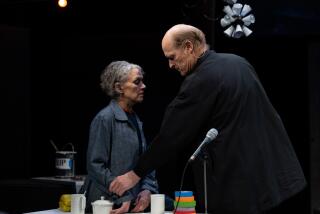Inauthentica offshoot goes deep and dark route
- Share via
There is a new music collective in town that goes by the cheeky name ensemble Inauthentica. Presumably, that’s a well-deserved dig at old music collectives that purport to reproduce an “authentic” performance of a score, sometimes at the expense of such values as feeling, interaction and beauty of sound.
However, what we saw and heard at REDCAT on Wednesday night was not the authentic ensemble Inauthentica -- whatever that may be. Instead, the concert was mostly staffed by a division of the collective, one that split off from Southwest Chamber Music in 2003 and calls itself the feHrmEnbuRg Trio. If you’re still following, that’s a combination of the names of cellist Paula Fehrenbach, violinist Mark Menzies and pianist Gayle Blankenburg.
Together, these three spent most of the evening piecing together Wolfgang Rihm’s gigantic piano trio “Fremde Szenen I-III,” an often grandiose, high-strung, vintage 1982-83 monster from the Teutonic swamps of the 19th century.
At times in this 48-minute piece, Rihm seems to be dragging Central European Romanticism kicking and screaming into the late 20th century; the opening of the sprawling Szenen II sounds like a postmodern parody of Brahms (Rihm claims his inspiration was Schumann). Also, the composer hammers toward the climax of each Szenen with the obsessive intensity of a German Shostakovich.
It’s a powerful work in spots, also an exhausting one -- and the trio shrewdly (if incompletely) reduced the strain by placing Stephen “Lucky” Mosko’s sequenza of effects for solo violin, “Bow-Vine Song” (played by Menzies), in between Szenens I and II and inserting an intermission between II and III.
The evening finally took a big swerve toward the technological present with Roger Reynolds’ “Process and Passion,” one of a number of pieces of his that use a computer to process the sound of acoustic instruments through a battery of speakers. With guest cellist Hugh Livingston joining Menzies onstage, it worked best when the live instruments and their electronic reflections were in full, fluttery interplay.
All of this went under the umbrella title “Dark Matters” -- and yes, the prevailing ambience in Disney Hall’s experimental basement was definitely weighty.
More to Read
The biggest entertainment stories
Get our big stories about Hollywood, film, television, music, arts, culture and more right in your inbox as soon as they publish.
You may occasionally receive promotional content from the Los Angeles Times.










